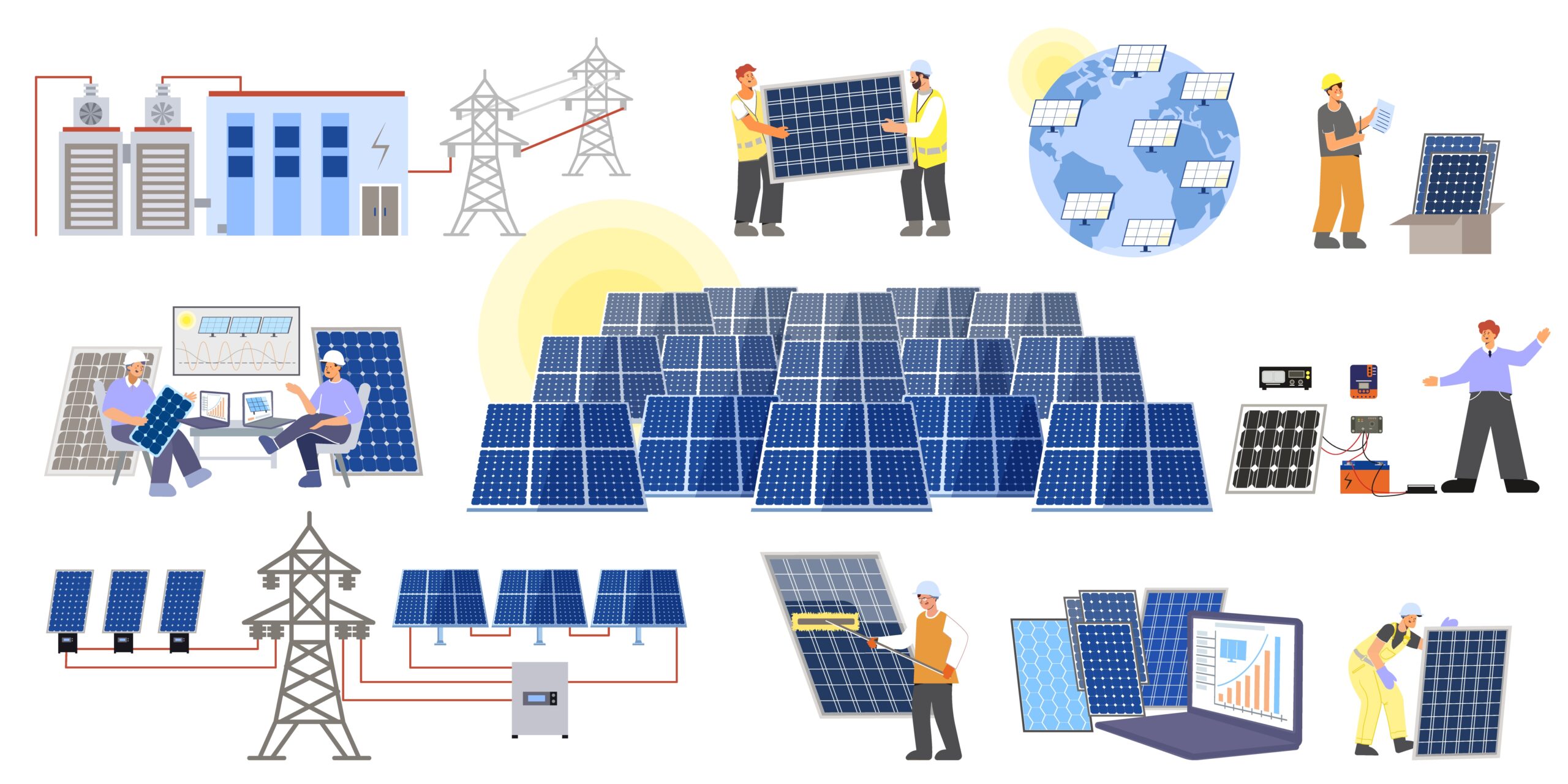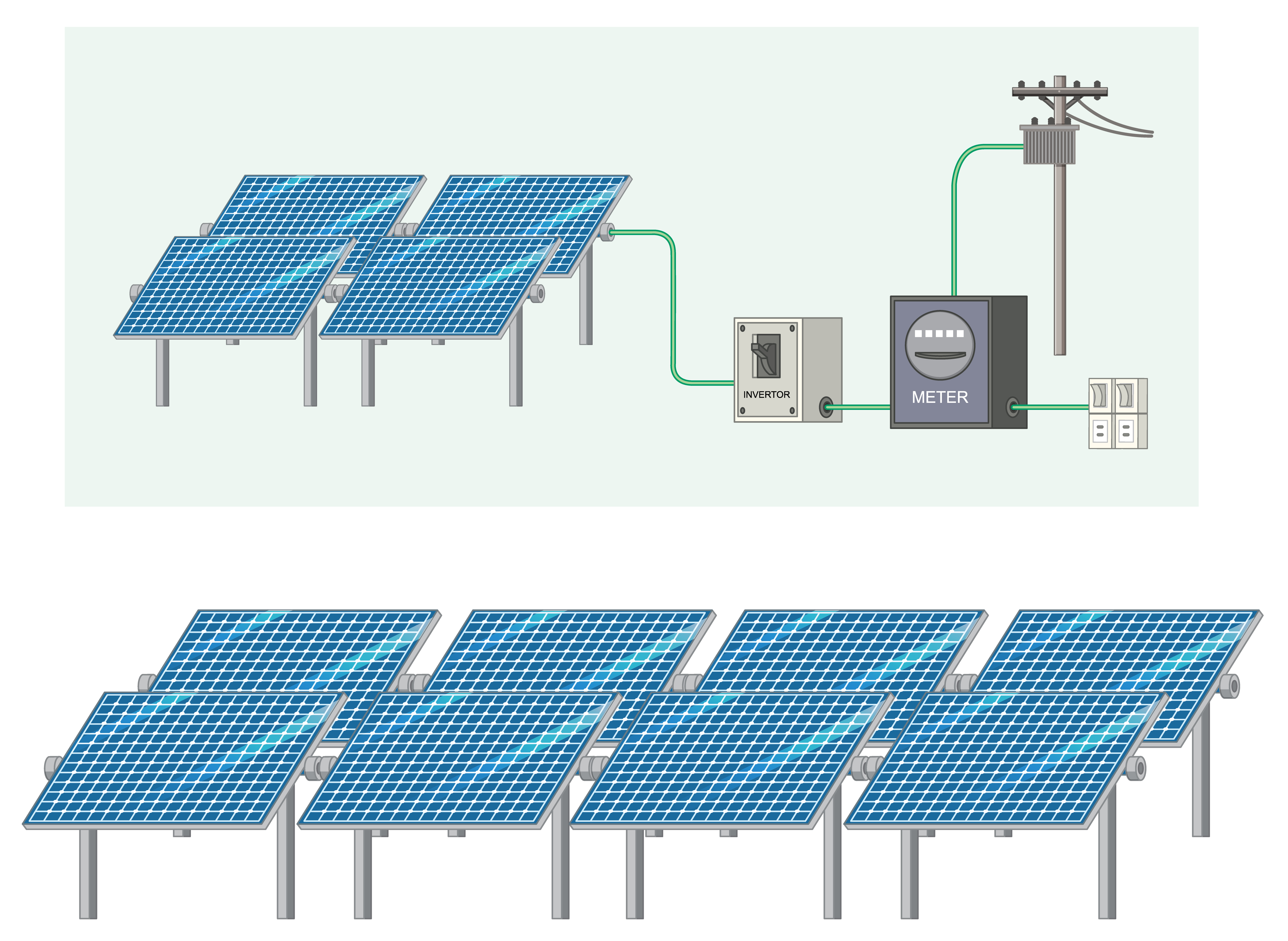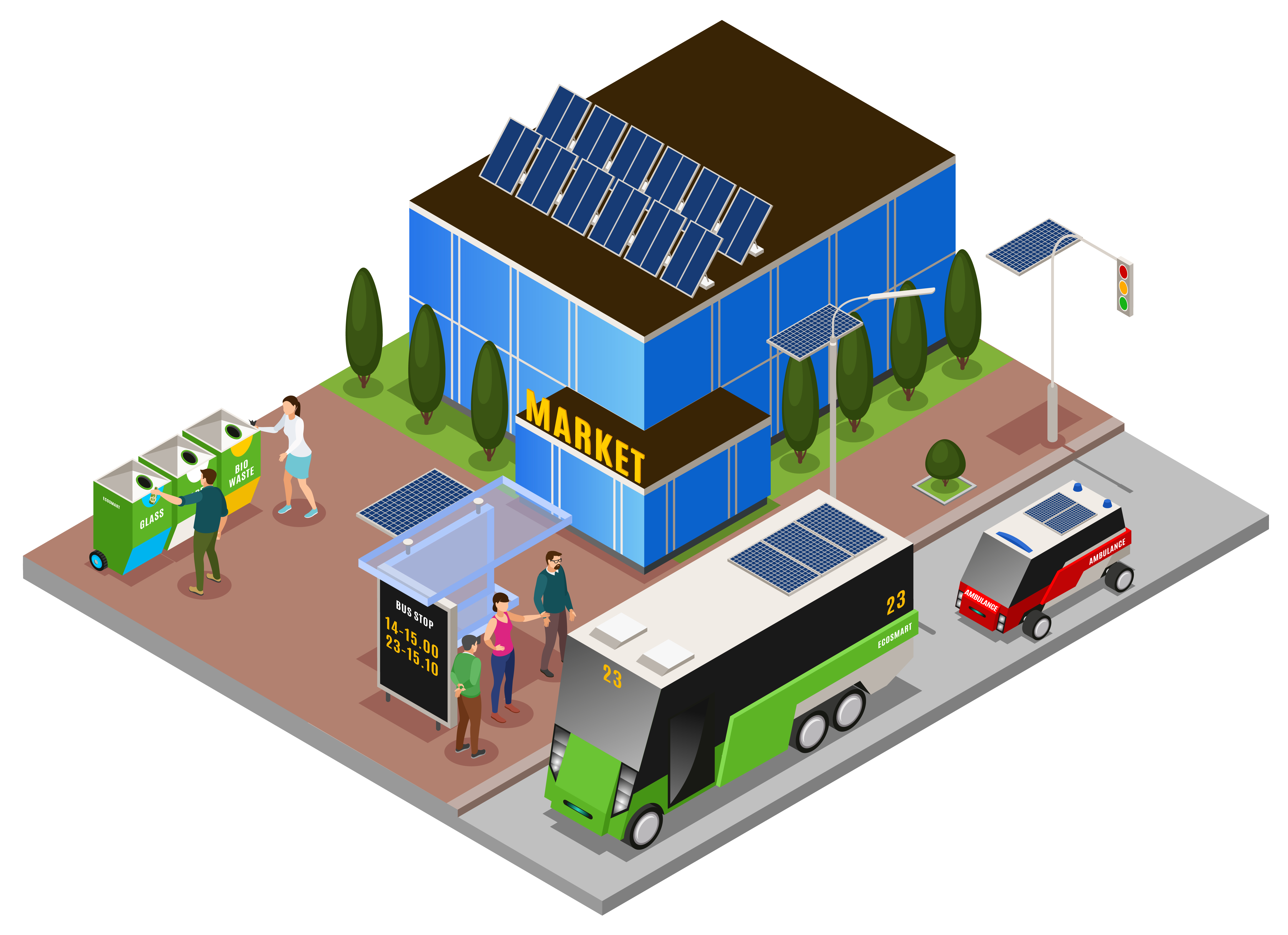As we stand on the brink of a renewable energy revolution, many businesses are looking to harness the power of the sun to fuel their operations. The benefits are clear: reduced energy costs, a smaller carbon footprint, and a strong statement of commitment to sustainability.
However, embarking on the solar journey brings its own set of challenges and decisions, the foremost among them being the selection of a solar installer.
This choice is critical, as the right installer can significantly impact the efficiency, cost-effectiveness, and overall success of your solar project. But with so many options available, how to choose a solar installer to finance B2B, and make the best decision for your business?
What’s the big deal about the solar industry today, and why should businesses care?
The solar industry possibly represents the leading force in the worldwide revolution in renewable energy, setting apart the new era of unlimited progress and development. This flowers from a combination of technical achievements, cost reduction, and public awareness of sustainable living.
Businesses are presented with new possibilities that they cannot ignore taking into account the consumer, investor, and government pressure of the rise of Environmental, Social, and Corporate Governance (ESG) requirements.
A significant drop in the cost of solar PV technology has occurred over the past ten years making it to be among the cheapest and most affordable renewable energy options to exploit. This major drop in the price of power has provided new opportunities for both big business and small operations to save on their energy bills thus paving the way for a secure and predictable energy future in the long term.

Through solar usage, companies will be able to lock in stable rates and thus will be safe from the fluctuation of traditional energy markets, which will result in predictability and stability in their financial operations.
Similarly, techno-developments are also fueling the flourishing of the solar industry globally. Solar panels’ efficiency, durability, and versatility have significantly improved, with businesses now able to deploy the technology almost everywhere.
Whatever the size of the solar farm, whether this is a sprawling commercial one or a simple rooftop installation, the versatility of the solutions means it will fit any business’s specific requirements and constraints.
The reasons for the engagement with the solar industry go beyond just the expected economic and technological benefits. Instead, there’s also a very strong ethical and environmental case for businesses to get into the solar game.
Consumers nowadays care strongly about brands that they see as environmentally friendly and proactive, trusting them to be ahead of the times and caring about what is best for our planet.
The wave of the solar revolution is not only about the reduction of emissions but also a great and efficient way to improve business reputation as well as attract even more environmentally sensitive consumers.
Governments around the world started introducing regulations and incentives to encourage the adoption of renewable energy sources, including solar. These can range from tax credits and rebates to mandates for renewable energy usage.
How can understanding the solar landscape help you make better choices?
When a business wants to develop renewable energy from the sun or another source, it is similar to a building that provides a strong foundation before the construction begins.
The solar industry with the pace at which it delivers the latest technology in the fields offers various opportunities for businesses that would like to be more economical and increase their production.
Such a field requires you to be extremely knowledgeable about things that may impact, and ultimately sway your decision-making.
To begin with, being informed about the new solar technologies as well as their advantages will allow you to take the most suitable and cost-effective business solutions in line with your particular business needs.
For example, clean solar panels show up with higher efficiency rates and are less pricey now than before.

The second aspect is to first understand the regulatory and policy environment. Diverse financial mechanisms, such as tax credits, rebates, and incentives, are available for businesses venturing into the solar energy market, however, those may differ from one country to another.
Awareness of the existing policies and benefits is vital because it assists you make an informed decision about the right period to invest your money and the installer with the technical know-how to navigate the financial policies proficiently that enables you to get maximum returns.
Moreover, the future of solar won’t be just about technology and policies; it also will be about economics and market trends. The ongoing trend of sustainability and green practices is growing not only among consumers but increasingly among B2B sector actors too.
Companies are nowadays starting to focus on dealing with and procuring from businesses that reveal concern for sustainability.
Why does the choice of solar installer make or break your B2B initiative?
The choice of a solar installer is a pivotal moment that can significantly influence the trajectory of your B2B solar initiative. This decision holds the power to either propel your project toward success or lead it into a myriad of challenges.
Here’s why the selection of your solar installer is so crucial:
- Expertise and experience matter immensely in the solar industry.
A seasoned installer brings a wealth of knowledge about the best practices, the most efficient technologies, and the nuances of navigating local regulations and incentives.
They can design a system that maximizes energy production and ROI for your specific business needs and location. On the other hand, an inexperienced installer might overlook critical factors, leading to suboptimal system performance or costly compliance issues down the line.
- The quality of installation and equipment directly impacts the longevity and efficiency of your solar energy system.
A top-notch installer not only uses high-quality panels and components but also ensures that the installation is executed to perfection. This meticulous attention to detail can mean the difference between a system that has thrived for decades and one that requires frequent repairs and adjustments.
Moreover, the solar installer you choose becomes your partner in this journey, offering ongoing support, maintenance, and potentially even financing solutions. Their commitment to customer service and their ability to provide comprehensive, hassle-free support is essential for a smooth and beneficial solar experience.
A reliable installer will stand behind their work, offering warranties and assistance that protect your investment and peace of mind over the long term.
Can the Right Partnership Truly Transform Your Solar Project’s Outcome?
Absolutely. The right solar installer acts as more than just a service provider; they become a strategic partner in your business’s journey toward sustainability and energy independence. This partnership can transform your solar project’s outcome in several key ways.
A collaborative approach to project planning and execution ensures that the solar installation is perfectly tailored to your business’s needs, operational dynamics, and future growth plans.

This customization goes beyond mere technical specifications; it encompasses a deep understanding of your business’s strategic objectives, enabling the solar project to support and enhance your overall mission.
Moreover, a strong partnership fosters innovation. An installer who is committed to your project’s success will actively seek out the latest technologies and methodologies to improve your solar system’s performance.
This could mean adopting cutting-edge solar panels that offer higher efficiencies or implementing smart monitoring systems that provide real-time data on energy production and usage.
How to choose a solar installer to finance B2B, What to Look Out For?
Choosing the right solar installer for your business-to-business (B2B) financing needs is a pivotal decision that can significantly influence the success and efficiency of your solar project.
This choice goes beyond just picking a service provider; it’s about forming a partnership that aligns with your business’s values, goals, and financial considerations.
Here are some factors to consider when selecting a solar installer for B2B financing:
- Experience and expertise
Look for an installer with a robust track record of successful B2B projects. Experience in your specific industry can be a huge plus, as it means the installer will be familiar with the unique challenges and requirements of your sector. Expertise in the latest solar technologies and installation practices ensures your project will be handled with the highest standards.
- Financial stability and options
A financially stable installer is crucial, especially for large-scale B2B projects that require significant investment and long-term commitments. Assess their financing options; some installers offer flexible financing solutions, including leases, power purchase agreements (PPAs), and loans, which can make solar energy more accessible and financially viable for your business.
- Licenses, certifications, and insurance
Ensure the installer has all the necessary licenses and certifications to operate in your area. These credentials are not “just paperwork”, they signify the installer’s commitment to adhering to industry standards and regulations.
Insurance is equally important, as it protects both your business and the installer in case of unforeseen circumstances.
- Reputation and reviews
The reputation of a solar installer can tell you a lot about the quality of their work and their customer service. Look for reviews and testimonials from other businesses, especially those similar to yours.
Negative reviews aren’t necessarily a deal-breaker, but how the company responds to and addresses these complaints can be very telling.
- Post-installation support and maintenance
The relationship with your solar installer shouldn’t end once the panels are up and running.
Ongoing support and maintenance are crucial for the long-term success and efficiency of your solar investment. Look for installers who offer comprehensive maintenance packages and responsive customer service to address any issues that may arise.
- Sustainability and environmental commitment
For many businesses, the move to solar is part of a broader commitment to sustainability. Choosing an installer who shares these values and practices them in their operations can enhance your company’s environmental credentials and contribute to a more sustainable future.
Which Financing Options Are Best for Your B2B Solar Projects?
When it comes to financing B2B solar projects, the landscape is as varied as it is complex.
Navigating this terrain requires a clear understanding of the options available and how they align with your business’s financial health, sustainability goals, and long-term energy needs.
The most common financing options include solar leases, power purchase agreements (PPAs), and solar loans, each with its unique benefits and considerations.
Solar Leases allow businesses to rent their solar energy system, avoiding upfront costs while enjoying the benefits of solar power. This option is ideal for businesses looking for minimal initial investment and predictable monthly payments.
However, since the leasing company owns the system, they also reap the tax credits and incentives.
Power Purchase Agreements (PPAs) are similar to leases in that they require no upfront costs. Under a PPA, a third party installs and maintains a solar system on your property, and you purchase the power generated at a predetermined rate, which is often lower than the local utility’s price.
PPAs are attractive for businesses looking to lock in energy costs and avoid operational responsibilities, but they also mean the benefits of ownership, like tax credits, go to the third party.
Solar Loans offer a way to finance the purchase and installation of a solar system, allowing businesses to own the system outright.
Ownership means not only benefiting from lower energy costs but also qualifying for tax credits, rebates, and incentives. Loans require an upfront investment but offer the potential for significant long-term savings and increased property value.
What Questions Should You Ask Potential Solar Installers to Ensure a Perfect Fit?
Choosing the right solar installer for your B2B project is a critical decision that requires careful consideration and due diligence.
To ensure a perfect fit between your business needs and the capabilities of your solar installer, there are several key questions you should ask potential candidates.
These questions will help you gauge their experience, reliability, and the quality of their service, ultimately guiding you to make an informed decision.
- What is your experience with B2B solar projects similar to ours?
Understanding the installer’s track record with projects similar in scale and complexity to yours is crucial. Ask for case studies or references from past clients, especially those within your industry. This will give you insight into their ability to handle your specific needs and the success rate of their installations.
- Can you provide a detailed quote and project timeline?
A detailed quote should include all costs associated with the project, from equipment and installation to any potential maintenance fees. Additionally, a clear project timeline will help you plan for the installation process and set expectations for project completion. Transparency in these areas is key to avoiding unexpected costs or delays.
- What financing options do you offer, and how do they work?
Since financing is a significant aspect of solar projects, understanding the different options available and their implications for your business is essential. Whether it’s a lease, loan, or power purchase agreement (PPA), each option has its pros and cons. A reputable installer should be able to explain these clearly and help you determine the best fit for your financial situation.
- How do you handle permits and regulations?
Navigating the legal and regulatory landscape of solar installation can be complex. Your installer should have a thorough understanding of the necessary permits and regulations in your area and be responsible for obtaining them. This question will help you assess their knowledge and experience in compliance matters.
- What warranties and maintenance services do you offer?
Warranties and maintenance are crucial for the long-term performance and reliability of your solar system. Inquire about the length and coverage of the product and workmanship warranties, as well as the availability of maintenance services. This will ensure that your system remains efficient and productive over its lifespan.
- How do you ensure the system’s performance and efficiency?
Ask about the steps the installer takes to design and optimize the system for maximum efficiency and performance, including site assessment, system design, and technology selection. Understanding their approach to these aspects can give you confidence in the effectiveness of the proposed solution.
Are there any success stories or cautionary tales that can guide us in making a better choice?
Indeed, the journey of transitioning to solar energy is paved with both inspiring success stories and cautionary tales that offer valuable lessons for businesses considering their solar projects.
Many businesses have successfully harnessed the power of solar energy, achieving significant cost savings, enhanced sustainability profiles, and even generating additional revenue.
For instance, a well-known retail giant embarked on a solar initiative across many of its locations, leveraging both rooftop and ground-mounted systems. This move not only slashed their operational costs by a substantial margin but also positioned them as a leader in corporate sustainability, attracting positive customer attention and loyalty.
The key to their success was a thorough vetting process to select a solar installer with a robust track record, strong financial backing, and a clear understanding of the business’s specific needs and goals.

On the flip side, some businesses have faced challenges due to poorly executed solar projects. A notable example involves a small manufacturing company that rushed into a solar lease agreement without fully understanding the terms and the technology’s suitability for their specific site conditions.
The system underperformed, and the fixed lease payments became a financial burden, rather than the cost-saving measure they had anticipated. That’s why it’s important to conduct due diligence, seek independent advice, and insist on detailed performance guarantees from installers.




